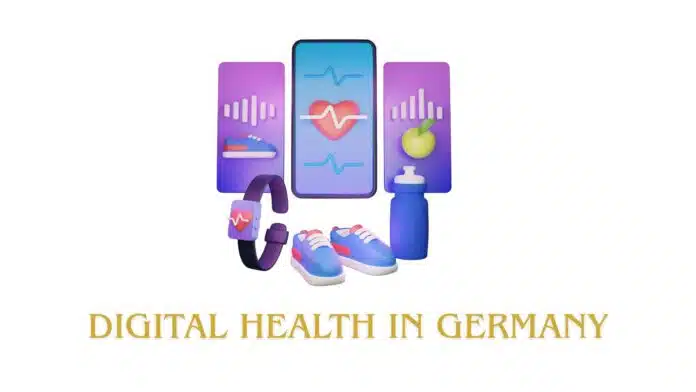I recently moved to Berlin, and after spending a week getting settled, I finally went to see a doctor. The appointment went smoothly, but then they handed me a pink slip filled with medical terms in German. I nodded and smiled politely, but as I walked out, I realized I had no clue what had just happened or what I was supposed to do next. Does that sound familiar?
If you’re an expat living in Germany, navigating the local healthcare system can feel overwhelming, especially when it comes to new technologies like DiGA health apps and e‑prescriptions. But here’s the good news: Germany is undergoing a digital health revolution, and once you understand how it works, it can make your care faster, simpler, and more personalized than ever before.
Germany is making significant strides to modernize its healthcare system, thanks to a law introduced in 2019 known as the Digital Healthcare Act. This means that by 2025, features such as electronic prescriptions and digital health apps that doctors can prescribe will be standard components of how healthcare is delivered. These tools, once seen as new or unusual, will now be essential for patients and healthcare providers.
As part of the ongoing evolution of Digital Health in Germany, patients can now expect more streamlined processes and innovative solutions in their healthcare journey.
With over 73 million people covered under Germany’s statutory health insurance (Gesetzliche Krankenversicherung or GKV), digital services are rapidly becoming standard. Yet, for many expats, especially those unfamiliar with the language or system, a significant information gap remains.
That’s where this guide comes in.
We’ll walk you through everything you need to know, from how to get a DiGA app prescribed to where and how to redeem an e-prescription and how to manage your digital health records using Germany’s new electronic patient file (ePA).
Whether you’re new to Germany or simply tired of paper-based processes, this expat-friendly guide will help you take full advantage of Germany’s modern healthcare tools with clarity, confidence, and ease.
Understanding DiGA Apps – Your Digital Health Companion
In a country known for its bureaucracy and extensive paperwork, DiGA apps represent a refreshing leap into the future of healthcare. Short for Digitale Gesundheitsanwendungen (Digital Health Applications), DiGAs are certified health apps or web-based tools that doctors and psychotherapists in Germany can now officially prescribe, just like medication.
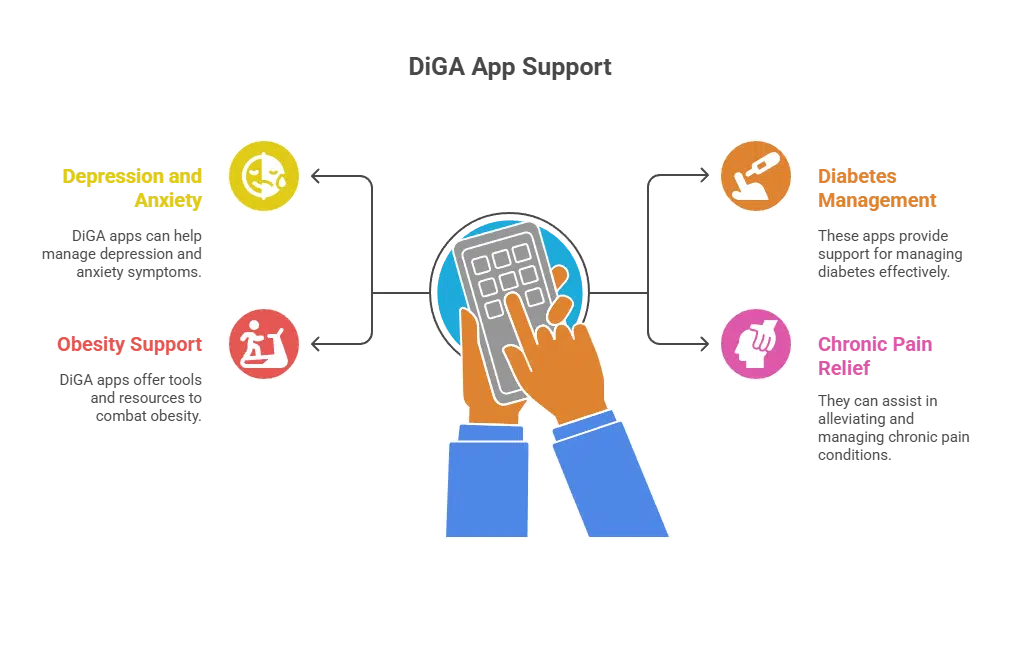
This innovation is a key component of Germany’s growing digital health landscape, ensuring that citizens and expatriates alike can benefit from advanced medical technologies.
Designed to help manage a wide range of health conditions, DiGA apps support everything from depression, anxiety, and diabetes to obesity and chronic pain. They’re part of Germany’s broader push to digitize healthcare and offer accessible, ongoing support beyond the doctor’s office.
What Exactly Is a DiGA App?
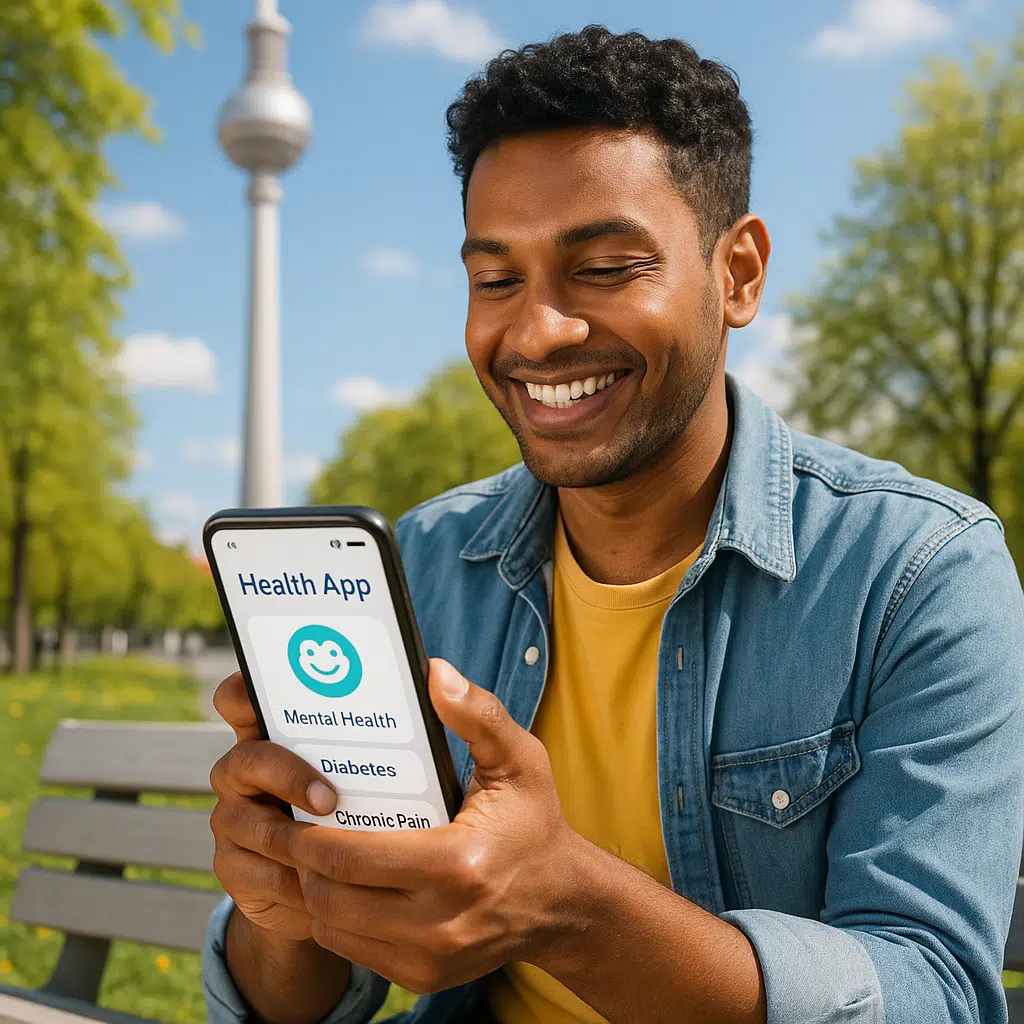
A DiGA app is more than just a wellness tracker. It’s a medical-grade digital tool that has been reviewed and approved by Germany’s Federal Institute for Drugs and Medical Devices (BfArM). To be included on the official list, each app must demonstrate its effectiveness in improving patient health outcomes.
Key Features:
- Only prescribable by a licensed doctor or psychotherapist
- Scientifically tested for effectiveness
- Fully reimbursed by statutory health insurance (GKV)
A Growing Market: DiGA in Numbers
As of July 2024, there are 56 officially listed DiGA apps available in Germany. To date, over 374,000 prescriptions have been issued, demonstrating that both doctors and patients are embracing the technology.
Popular DiGA Examples:
- Zanadio – for the digital treatment of obesity
- Kalmeda – for tinnitus management
- Deprexis – to support those with depression
- Priovi – therapy support for borderline personality disorder
These apps combine digital coaching, cognitive behavioral therapy, symptom tracking, and more, often with daily exercises and feedback.
Why DiGA Matters for Expats
If you’re insured under Germany’s statutory health insurance (GKV), you’re eligible for DiGA prescriptions, just like any German citizen. And for many expats, DiGA apps fill a crucial gap:
- Some offer English-language interfaces, making them easier to use than printed prescriptions or in-person group therapy
- They allow you to self-manage your condition at your own pace, without language stress or waiting times
- You can receive access via prescription or by contacting your health insurance provider directly
“I was prescribed a DiGA for anxiety. It had an English option, guided exercises, and really helped between therapy sessions,” says Anika, an expat in Hamburg.
Next Steps: Explore Your Options
If you’re curious whether there’s a DiGA for your needs, start with the official BfArM DiGA directory. You can filter apps by condition and see which ones are currently covered by public insurance.
Mit Millionen des Bundes hätte Deutschland die Digitalisierung der Gesundheitsämter auf ein neues Niveau heben können. Doch Überforderung und Kleinstaaterei haben den großen Wurf bei der Digitalisierung verhindert: https://t.co/P7zSnXvwWw
— Stefan Sell (@stefansell) July 17, 2025
How DiGA Apps Are Prescribed and Accessed
If you’re new to the German healthcare system, getting a health app through your doctor might sound futuristic, but in 2025, it’s surprisingly routine. DiGA apps, just like traditional medication, can now be officially prescribed. And the best part? If you’re covered by statutory health insurance (GKV), the cost is fully reimbursed.
Here’s how to navigate the DiGA prescription process step by step, no advanced German required.
Step 1: Get a Diagnosis and Prescription from Your Doctor
A DiGA must be tied to a medical condition, so the process begins with a visit to your Hausarzt (GP), specialist, or psychotherapist. If they determine that a certified DiGA would support your treatment, they will issue a prescription using a PZN (Pharma-Zentralnummer), a unique code assigned to each DiGA, similar to the way medications are coded.
Not every doctor is familiar with DiGA apps yet, so if you believe one could help, don’t hesitate to bring it up. You can also print a summary (in English or German) from the BfArM DiGA directory to help explain your case.
Alternative Access via Health Insurer
No doctor’s appointment? No problem. If you’ve already received a diagnosis and want to skip the clinic visit, you can apply directly to your health insurer. Provide proof of your condition (such as a diagnosis letter or a past prescription), and they can approve access.
This alternative route is gaining popularity, with around 15% of DiGA users now obtaining their apps in this manner.
Get Your Activation Code and Download the App
Once your prescription is processed, whether through your doctor or insurer, you’ll receive a 16-digit activation code by mail, email, or through your insurer’s online portal.
You’ll then:
- Download the DiGA app from the Apple App Store or Google Play
- Enter your activation code to unlock full access
- Start your therapy program or tracking routine
What Does It Cost? (Spoiler: Nothing for You)
DiGA apps are 100% covered by statutory health insurance. You won’t pay a cent out of pocket. After pricing negotiations between the app developer and the GKV, the median cost for a 3-month DiGA prescription is currently €221, but this is handled entirely behind the scenes.
Tips for Expats:
- Ask your doctor directly: Some providers may not yet offer DiGA prescriptions unless prompted.
- Bring supporting documents: If you’re seeing a new doctor in Germany, bring English-language reports or past diagnoses.
- Double-check app language: Some DiGAs offer English versions, others don’t. You can verify this on the BfArM listing or in the App Store preview.
DiGA Usage Snapshot (2024)
- Top 15 DiGAs = 82% of all prescriptions
- Daily prescriptions per app range from 8 to 77
- Most-used apps target mental health, metabolic disorders, and chronic pain
E‑Prescriptions – A Seamless Digital Solution
Gone are the days of deciphering messy handwriting on a pink slip; e-prescriptions (E-Rezepte) are now the norm across Germany’s healthcare system. As of 2025, the paper prescription has been fully phased out for anyone covered by statutory health insurance (GKV), replaced by a streamlined digital solution that’s modern, secure, and surprisingly expat-friendly.
What Are E-Prescriptions?
An e-prescription is a digital medication order issued by your doctor and linked directly to your electronic health card (eGK). Instead of handing you a physical note, your doctor sends the prescription electronically to a secure central server.
You can then redeem your medication at any pharmacy by:
- Scanning your eGK card, or
- Using a mobile app linked to your health insurance profile
This system eliminates paperwork, reduces errors, and helps patients, especially expats, navigate prescriptions without getting lost in translation.
How the E-Prescription Process Works
- Doctor’s Appointment
Your doctor writes the e-prescription directly into their practice management system after your consultation. - Secure Upload
The prescription is uploaded to the Gematik e-prescription system, linked to your insurance details. - Pharmacy Redemption
At the pharmacy, simply:- Insert your eGK into the card reader, or
- Open your insurer’s e-prescription app to show the QR code
- Receive Medication
The pharmacist accesses your prescription in seconds, eliminating the need for paperwork.
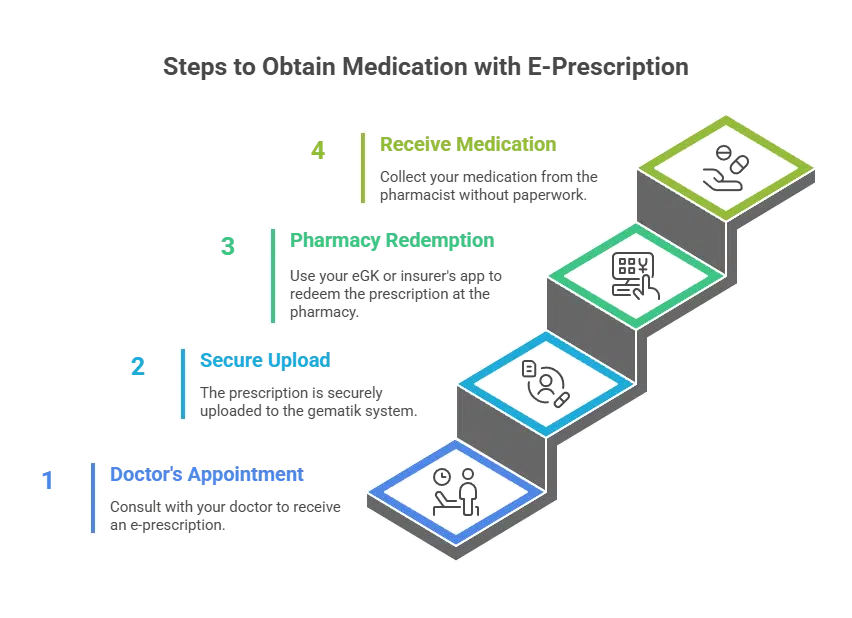
Adoption in 2025: Widespread and Standardized
As of January 2025:
- All statutory health insurance providers now support e-prescriptions
- Over 73 million users can access prescriptions digitally
- Electronic patient records (ePA) are also available to all GKV-insured individuals
Germany’s digitization push is in full swing, and e-prescriptions are a key pillar of that progress.
Why E‑Prescriptions Matter for Expats
For newcomers navigating a foreign healthcare system, e-prescriptions offer major advantages:
- No language stress: No need to read handwritten or German-only documents
- Fewer mistakes: Automated entry reduces errors and misunderstandings
- Time-saving: You can go straight to any pharmacy—no return trips or misplaced papers
- App support: Most e-prescription apps are designed with visual clarity and accessibility in mind, and some include English interfaces
Things to Watch For
- Pharmacy readiness: While most are now eGK-compatible, some small or rural pharmacies may still need setup assistance
- Card activation: Make sure your eGK (electronic health card) is active and up to date before your next prescription
- App login: Ask your insurer about which e-prescription app to use; it varies by provider (e.g., TK, Barmer, AOK all have their own)
Tip: If you’re unsure whether your eGK is ready, call your insurer’s English-language support line or visit their office with ID and your insurance card.
2025 Digital Health Milestone
| Feature | Status as of Jan 2025 |
|---|---|
| E-Prescriptions (E-Rezept) | Mandatory nationwide |
| Electronic Patient Record (ePA) | Available to all GKV users |
| Paper Prescriptions | Phased out |
Privacy and the Electronic Patient Record (ePA)
When it comes to digital healthcare, privacy is everything, and for many expats in Germany, it’s also a top concern. From DiGA apps to e-prescriptions, Germany’s digital health system is built around strict data protection standards, and the electronic patient record (ePA) is no exception.
Launched for universal use in January 2025, the ePA marks a major step toward integrated, accessible healthcare, but it’s designed with privacy at its core.
What is the ePA (Elektronische Patientenakte)?
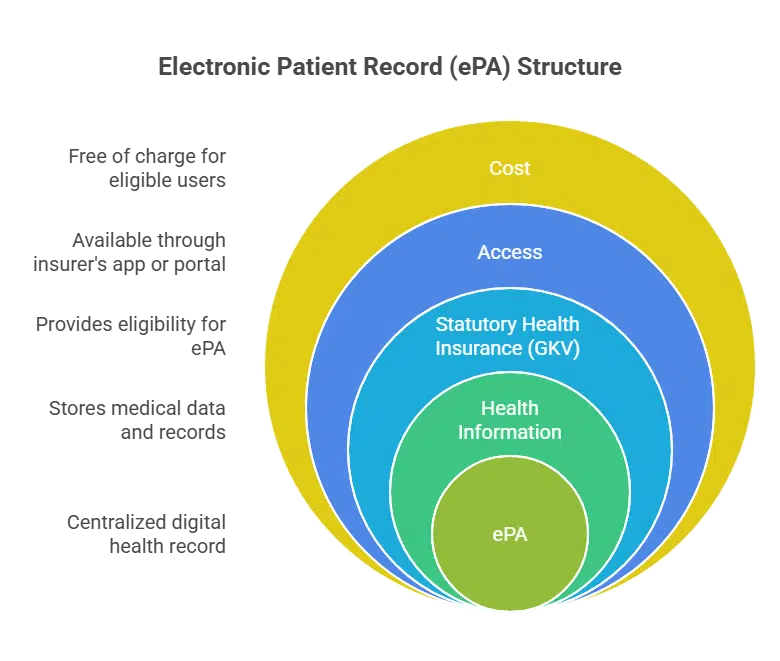
The ePA is a secure, digital file that stores your personal health information, doctor visits, lab results, imaging, vaccination records, prescriptions, and more, all in one centralized system.
If you’re covered by statutory health insurance (GKV), you’re automatically eligible for an ePA account. Access is available through your insurer’s official app or online portal, and it’s free of charge.
Think of it as your health cloud, available when you need it, fully protected when you don’t.
Privacy and Security: Built Into Every Step
Germany takes medical data protection seriously. All digital health tools, including DiGA apps and the ePA, must comply with:
- GDPR (General Data Protection Regulation)
- BfArM (Federal Institute for Drugs and Medical Devices) certification
- BSI (Federal Office for Information Security) cybersecurity standards
In 2025, these standards were updated to require multi-factor authentication, end-to-end encryption, and fine-grained access control for every ePA-enabled platform.
Only you decide who sees your data, and when.
What Expats Should Know About ePA Privacy?
- Opt-In System: You’re not automatically enrolled; you choose to activate your ePA.
- Consent First: No doctor, pharmacy, or DiGA provider can access your health data without your explicit permission.
- Language Options: Many insurers now offer English-language app interfaces or telephone support for setup and troubleshooting.
- App Access: Once activated, your ePA is viewable through your insurance app, allowing you to upload or review documents at any time.
“Knowing that I control exactly who sees my data made me feel safe using the ePA,” says Samira, an expat from the UK living in Munich.
What About Data Breaches?
While no system is 100% immune, Germany’s robust legal framework and technical protections make the ePA one of the most secure digital health systems in the EU. Regular audits, encrypted cloud storage, and restricted third-party access significantly reduce risks.
Still, it’s wise to:
- Use strong, unique passwords
- Keep your insurance app updated
- Enable 2-factor authentication if available
How to Set Up Your ePA
- Download your insurer’s official app (e.g., TK-App, AOK Mein Leben, Barmer-App)
- Register or log in using your insurance number and ID
- Follow the in-app steps to activate your ePA account
- You can now upload, view, and share files with doctors or hospitals, with complete control
If you’re unsure where to start, contact your insurance provider’s English-language support hotline or visit their local branch with your eGK card and passport.
Germany’s Digital Health Security Snapshot (2025)
| Feature | Security Status |
|---|---|
| ePA (Electronic Patient Record) | GDPR-compliant, user-controlled access |
| DiGA Apps | Certified by BfArM + BSI |
| e‑Prescriptions | Encrypted transmission only |
Expat Roadmap – Navigating Digital Health in Germany
Getting started with Germany’s digital healthcare system might seem intimidating, but with the proper steps, it can quickly become a smooth part of your new life abroad. Whether you’re dealing with prescriptions, chronic conditions, or just curious about e-health tools, this guide will walk you through it all, step by step.

Register with Statutory Health Insurance (GKV)
Before accessing any digital health services, you need to be enrolled in Germany’s statutory health insurance system. Most employed expats are automatically registered through their job. Once enrolled, you’ll receive an electronic health card (eGK), your gateway to prescriptions, digital records, and more.
Tip: Double-check your coverage type—around 10% of people in Germany have private insurance, which may not include DiGA access.
Activate Your ePA (Electronic Patient Record)
Once you receive your eGK, download your insurer’s app (like TK-App, Barmer-App, or AOK Mein Leben) or visit their website. From there, you can:
- Set up your ePA
- Control who can access your medical data
- Upload documents or view lab results—all digitally
English-language setup support is often available via phone or in local branches.
Consult Your Doctor About DiGA Eligibility
If you have a chronic or mental health condition, like depression, obesity, tinnitus, or anxiety, you may qualify for a DiGA app prescription. Consult with your doctor or psychotherapist to discuss available options. If your German isn’t fluent, bring translated medical records or consider bringing a friend along for support.
Get a DiGA or E-Prescription
After consultation:
- Your doctor may issue a DiGA prescription using a unique PZN code
- Or, they may generate an e-prescription for medication, linked to your eGK
Once approved, you’ll receive an activation code (for DiGAs) or can redeem prescriptions at any pharmacy using your card or app.
Troubleshoot Issues Early
If you’re waiting for an activation code, having trouble with app access, or are unsure about next steps:
- Call your insurer’s helpline; many offer English support
- Check the BfArM DiGA directory for app details and user FAQs
- Visit expat forums or Facebook groups for real-world tips from other users
- For insurance queries, GKV-SV (www.gkv-spitzenverband.de) is the official resource
Digital Healthcare for Expats: Quick Snapshot
| Step | Tool or Resource |
|---|---|
| Health insurance enrollment | GKV-SV (public) or PKV (private) |
| Activate digital record (ePA) | Insurer app or portal |
| Find approved DiGA apps | BfArM DiGA Directory |
| Fill e-prescriptions | eGK card or insurance mobile app |
| Help and troubleshooting | Insurer helpline or local expat forums |
With just a few steps, you’ll be able to access top-tier healthcare tools from your phone, in your language, and without the stress of paper forms and lost prescriptions. Germany’s system may be complex at first, but once set up, it offers some of the most secure, efficient, and expat-accessible digital care in Europe.
Challenges and Tips for Expats
Adapting to Germany’s digital healthcare system presents a learning curve, especially for expatriates. From language gaps to tech hiccups, the experience can feel overwhelming at first. But with the right tools and mindset, these challenges are manageable and often avoidable.
Here’s a look at the most common hurdles expats face when navigating DiGA apps, e-prescriptions, and the ePA, along with strategies for overcoming them.
Language Barriers
One of the biggest concerns for many newcomers is the lack of English-speaking healthcare providers. While some doctors and pharmacists speak basic English, many don’t—especially in smaller towns or rural areas.
Solution:
- Use platforms like Doctolib, Jameda, or TK-Finder to search for doctors with English-language services.
- Bring written translations of your medical history or symptoms
- Use translation apps like DeepL or Google Translate to bridge gaps during appointments
- Ask if your health insurer offers bilingual support lines or materials
Limited Awareness of DiGAs Among Doctors
Although DiGA apps are officially part of Germany’s healthcare system, not all doctors are familiar with how they work or that they can prescribe them.
Solution:
- Be proactive. Ask your doctor about DiGAs related to your condition
- Share a printed or digital link to the BfArM DiGA directory
- If needed, request a referral to a specialist or psychotherapist more familiar with digital treatment tools
Technical or Setup Issues
From app glitches to eGK card errors, technical problems can pop up, especially when you’re dealing with apps in German or trying to activate digital services without explicit instructions.
Solution:
- Call your health insurer’s customer service; most have English-speaking staff.
- Visit your insurer’s local office with your ID and eGK card to complete the in-person setup.
- Keep screenshots or error messages if you need to report bugs or delays
- Visit BfArM’s English-language pages for guidance on DiGA use and troubleshooting
Top Tips to Make the Transition Easier
- Join expat forums like Toytown Germany, Reddit’s r/germany, or city-specific Facebook groups, and real-life advice can save you time and stress.
- Carry a translated medical summary when visiting new doctors or applying for DiGA access.
- Check pharmacy readiness before redeeming your first e-prescription, especially in smaller areas.
- Bookmark the BfArM and GKV-SV websites for official updates and eligibility inf.o
Conclusion
Embracing Germany’s Digital Health Future as an Expat
Germany’s digital healthcare system has entered a new era, and expats are absolutely part of the journey. From DiGA apps that support mental health and chronic conditions to e-prescriptions that simplify pharmacy visits, the tools now available are truly changing how care is delivered.
With over 73 million statutory health insurance users now eligible to access these innovations, expats with GKV coverage can confidently participate in this modern system. Better yet, the rollout of English-language support, user-friendly apps, and simplified processes means you don’t have to speak fluent German to benefit.
If you haven’t already, take your first step:
- Explore the BfArM DiGA directory to see what apps could support your health
- Activate your electronic patient record (ePA) to centralize your medical history
- Talk to your doctor or insurer about what’s available to you
Whether you’re managing stress, starting therapy, or just picking up a prescription, Germany’s digital health tools are here to make life easier, not more complex.
We’d love to hear your experience. Have you used a DiGA or e-prescription yet?
Share in the comments, bookmark this guide, or contact your insurer for tailored support.
Your health, your pace, your language, Germany’s digital system is ready when you are.
Frequently Asked Questions (FAQ)
About Digital Health, DiGA Apps, and E‑Prescriptions in Germany
1. Can expats access DiGA apps and e-prescriptions in Germany?
Yes, if you’re enrolled in statutory health insurance (GKV), you’re wholly eligible for both DiGA apps and e-prescriptions. You can receive them through your doctor or apply via your insurance provider.
2. What’s the difference between a DiGA and a regular health app?
DiGA apps are medically certified by Germany’s Federal Institute for Drugs and Medical Devices (BfArM). Unlike regular health apps, they’re prescribed by doctors and reimbursed by insurance.
3. Do DiGA apps offer English-language versions?
Some do, but not all. Check the BfArM DiGA directory or app store descriptions to confirm if a specific app offers an English interface before requesting a prescription.
4. What if my doctor doesn’t know about DiGA apps?
That’s common. You can bring printed information from the BfArM directory and ask your doctor if they’d consider prescribing one. Many are open to learning if the app supports your treatment plan.
5. How do I redeem an e-prescription?
You can redeem it by:
- Inserting your electronic health card (eGK) at the pharmacy
- Or showing a QR code in your insurer’s official app
The pharmacist will access your prescription directly from the secure health system.
6. Is my health data safe in the digital system?
Yes. DiGA apps, e-prescriptions, and ePA files are all GDPR-compliant and protected by Germany’s national data security standards (BfArM and BSI). You also have full control over who accesses your information.
7. What if I have private insurance?
DiGA and e-prescription services are designed for statutory health insurance (GKV). If you’re privately insured, check with your provider; some may cover digital apps, but it’s not guaranteed.
8. Where can I find English-language support?
Try:
- Your insurer’s helpline or app
- BfArM’s DiGA directory (has some English content)
- Forums like Toytown Germany or expat Facebook groups for peer advice

